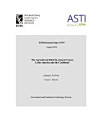Effects of agricultural mechanization on smallholders and their self-selection into farming: An insight from the Nepal Terai
Takeshima, Hiroyuki · Shrestha, Rudra Bahadur · Kaphle, Basu Dev · Karkee, Madhab · Pokhrel, Suroj · Kumar, Anjani
joulu 2016 · IFPRI Discussion Paper Kirja 1 · Intl Food Policy Res Inst
E-kirja
36
sivuja
family_home
Kelvollinen
info
reportArvioita ja arvosteluja ei ole vahvistettu Lue lisää
Tietoa tästä e-kirjasta
This research was undertaken to better assess the role of mechanization in the future of smallholder farmers in Nepal. It addresses the knowledge gap about whether promoting mechanization that is often complementary to land can effectively support smallholders, particularly in the face of a growing nonfarm sector. Rising rural wages in Nepal have increasingly put pressures on smallholder farmers, who tend to operate labor-intensive farming. Agricultural mechanization through custom hiring of tractor services has recently been considered as an option to mitigate the impact of rising labor costs for smallholders. However, the benefit of agricultural mechanization may still be better captured by exploiting the economies of scale of medium to large farmers rather than smallholders. In the meantime, the Nepal agricultural sector still employs a disproportionate share of workers given its share in the economy, potentially depressing agricultural labor productivity. It is therefore an important policy question whether to (1) continue supporting smallholders through custom-hired tractor services or (2) encourage smallholders to rent their farms out to medium-size or larger farmers, while helping smallholders specialize in the nonfarm sector, where their labor productivity may be higher. Using samples from the Terai zone—one of the agroecological belts in Nepal, largely consisting of lowland plains— from the Nepal Living Standards Survey, we assess whether the benefits of hiring in tractor services are greater among medium to large farmers than among smallholders, and how these benefits may depend on smallholders’ decision to remain in or leave farming. This study also contributes to the impact evaluation literature by showing that jointly assessing the effects of two treatments (whether to adopt custom-hired tractor services and continue farming, or to search for better options and specialize in off-farm activities) can lead to different implications than assessing them separately. Our analyses suggest that the government should continue to promote custom-hired tractor services not only for medium to large farmers but also for smallholders. If, over time, barriers to specializing in nonfarm activities are lowered and more smallholders start leaving farming, mechanization may no longer benefit the remaining smallholders. Support for mechanization can then be focused more on medium to large farmers, while types of support other than mechanization can be devised for the remaining smallholders.
Arvioi tämä e-kirja
Kerro meille mielipiteesi.
Tietoa lukemisesta
Älypuhelimet ja tabletit
Asenna Google Play Kirjat ‑sovellus Androidille tai iPadille/iPhonelle. Se synkronoituu automaattisesti tilisi kanssa, jolloin voit lukea online- tai offline-tilassa missä tahansa oletkin.
Kannettavat ja pöytätietokoneet
Voit kuunnella Google Playsta ostettuja äänikirjoja tietokoneesi selaimella.
Lukulaitteet ja muut laitteet
Jos haluat lukea kirjoja sähköisellä lukulaitteella, esim. Kobo-lukulaitteella, sinun täytyy ladata tiedosto ja siirtää se laitteellesi. Siirrä tiedostoja tuettuihin lukulaitteisiin seuraamalla ohjekeskuksen ohjeita.








